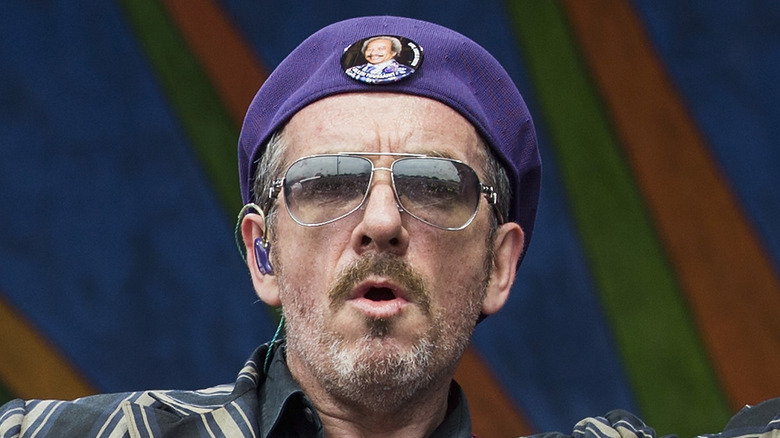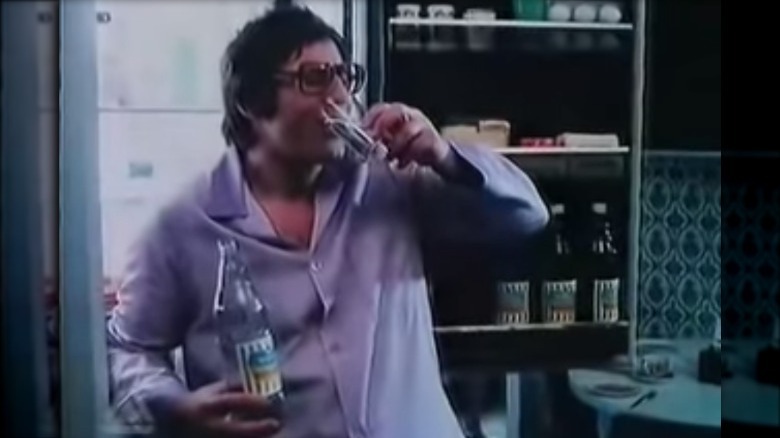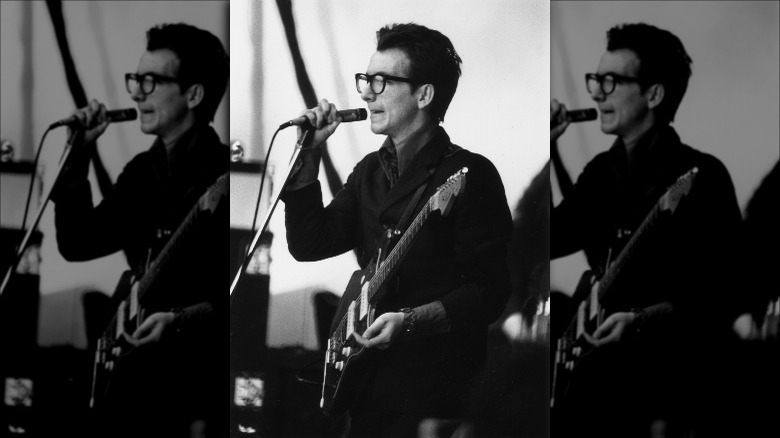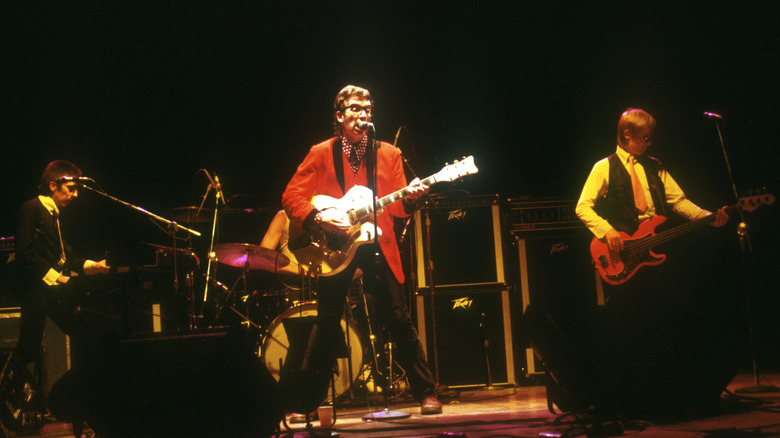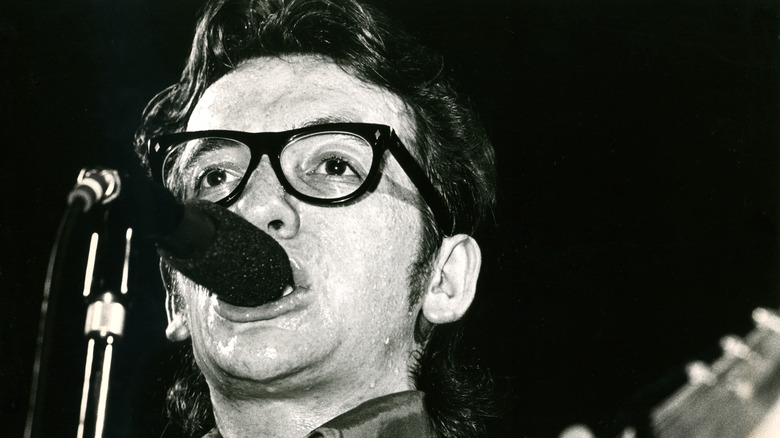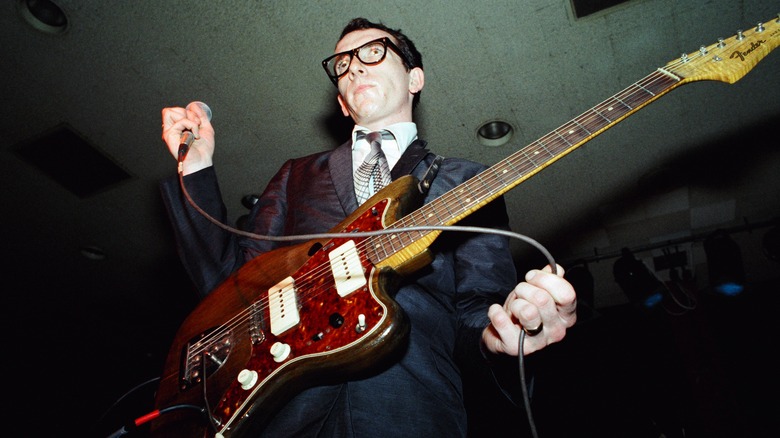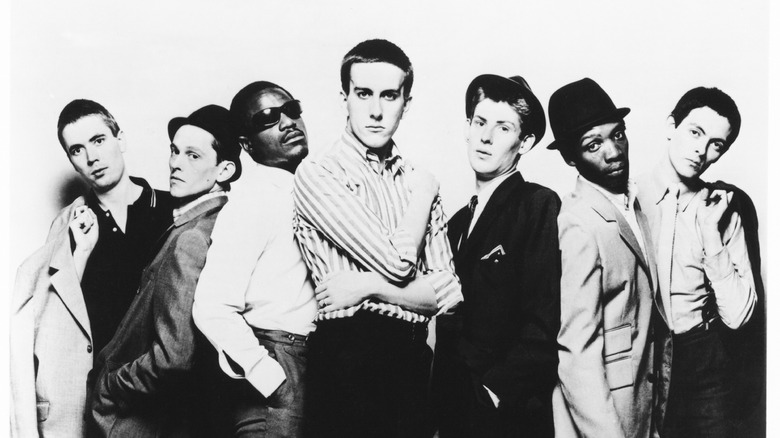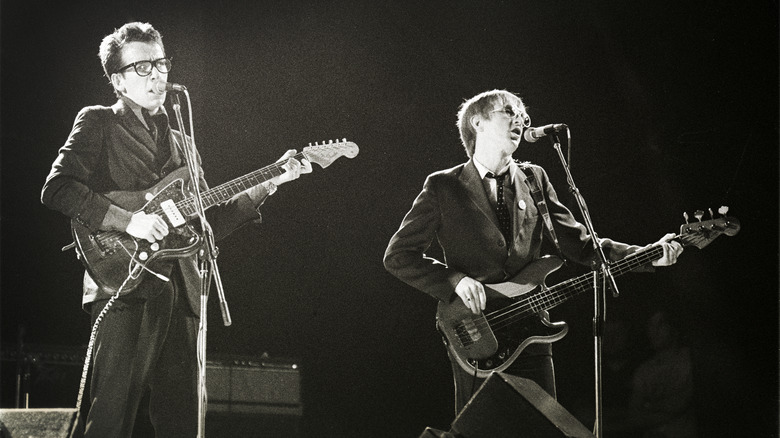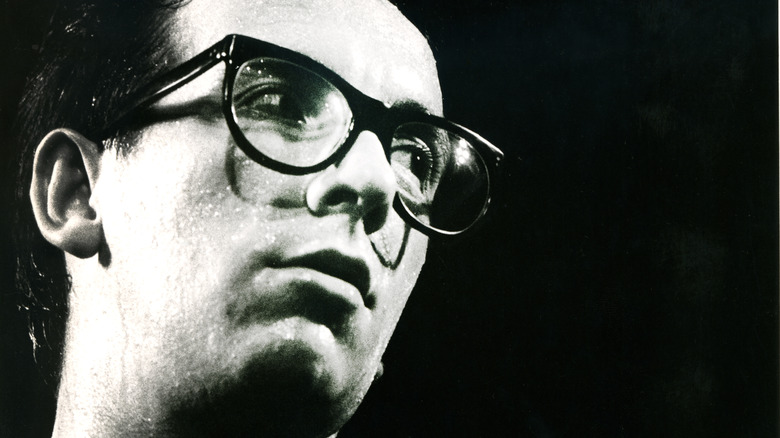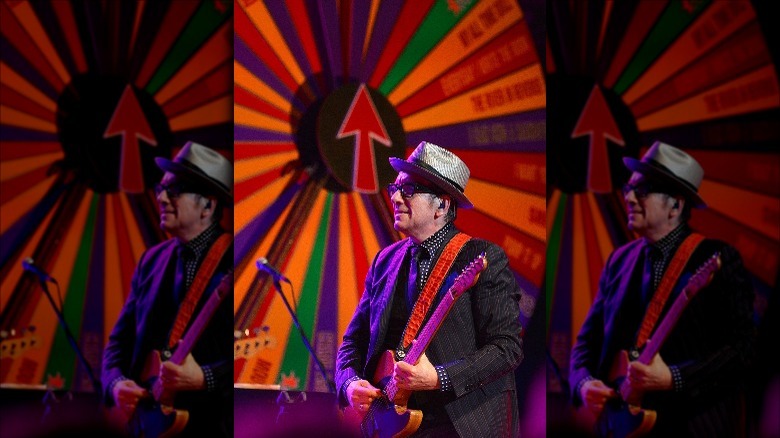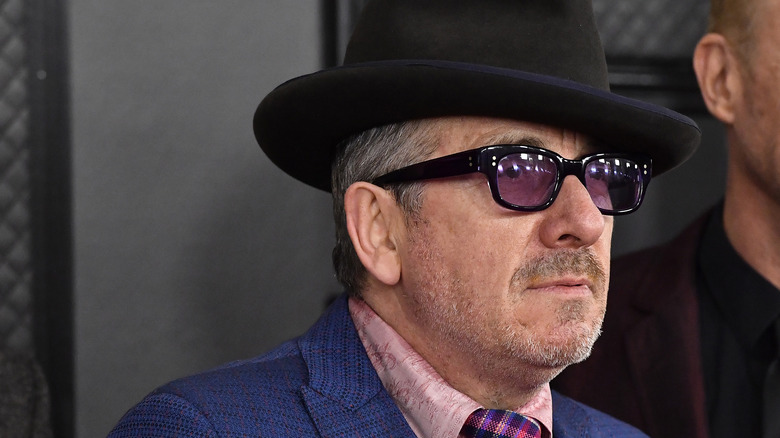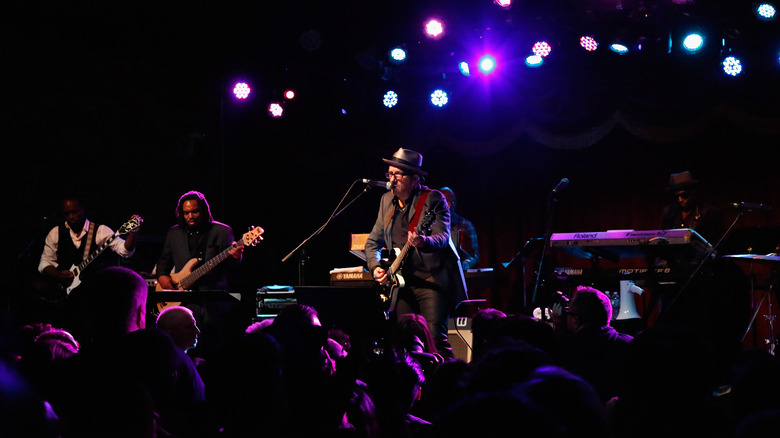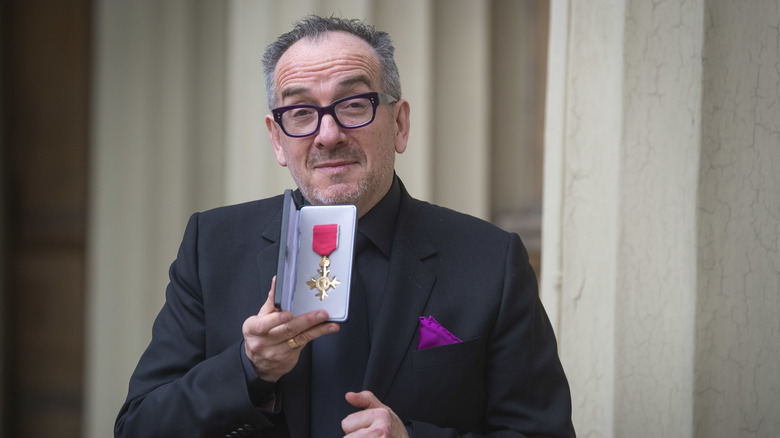The Untold Truth Of Elvis Costello
Very few acts from the late '70s new wave are still going as strong as Elvis Costello. The musician's momentum has barely wavered since his emergence in 1977 with his debut album. Fittingly titled "My Aim Is True," the record announced Costello as an eclectic musical talent of uncommon lyrical dexterity with an uncanny knack for earworm pop, and it demonstrated that he could seamlessly blend the influences of his youth — blues, soul, pub rock — with the contemporary trends of punk and new wave.
Since then, the songwriter has risen to the top of the pop pantheon, with a string of critically acclaimed albums, collaborations with his musical heroes such as Burt Bacharach and Paul McCartney, and an immaculate reputation as a crowd-pleasing live performer. In 2019, he was even awarded an OBE in the Queen's birthday honors list, according to Rolling Stone.
But the road to stardom is seldom easy –– here is the untold truth of Elvis Costello's long and eventful career.
Elvis Costello's musical family
There have been many theories why Liverpool became one of pop music's hotspots in the 1950s and '60s. One version is that a group of Liverpool-based sailors known as the Cunard Yanks would bring American records to the port city, which were unavailable anywhere else (per the Guardian). More recently, researchers have come to the more prosaic conclusion that Liverpool's NEMS record store was the key. The shop had the unusual policy of stocking every record issued in the U.K., and also had free listening booths, per Bob Pitt. Tellingly, the store was owned by Brian Epstein, who would go on to become the Beatles' influential manager. Liverpool's musical heart was still beating strongly when, in 1971, Declan MacManus moved with his Liverpudlian mother, Lillian, from Twickenham, London, to Birkenhead, just across the river from Liverpool. Declan MacManus would become better known as Elvis Costello.
Costello's father, Ross MacManus, was a musician, and Costello would gain his first taste of fame as his backing singer on the famous jingle "I'm A Secret Lemonade Drinker" (pictured), which became well known in the U.K. in 1974 (per the Guardian). But as Costello explained in a recent interview with the BBC, it was his mother who was the real music expert in the family. Lillian worked in a local record store, and passed her encyclopedic knowledge of music down to her son.
Elvis Costello's precarious early career
Elvis Costello's talent for songwriting and performance grew throughout the early 1970s, during which time he showcased his abilities on the local pub rock circuit. According to the Guardian, Costello's father advised the young musician to avoid drawing attention to his family's musical history — his father's group, the Joe Loss orchestra, was known as the U.K.'s biggest dance band in their heyday – but despite his musical connections, Costello was far from being an industry plant.
As described in his 2015 autobiography, "Unfaithful Music & Disappearing Ink" (via Vulture), Costello's early years as a musician were fraught with financial difficulty. By 1974, Costello was married, and the couple welcomed their first child, Matthew, shortly after. While Costello was eking out a living with irregular live performances in local pubs and attempting to gain attention for his music by sending a string of demos to British record companies, he also worked a number of day jobs, including at a bank and at the Elizabeth Arden cosmetics company. His wife, Mary, also worked, but the two failed to make ends meet, and were forced to move in with Costello's in-laws to get by until Costello finally secured a deal with Stiff Records.
A ban led to Elvis Costello's US breakthrough
Though the early singles "Less Than Zero" and "Alison" initially failed to chart, the U.K. release of Elvis Costello's debut album "My Aim Is True" in 1977 made him a celebrity. According to music writer Graeme Thomson's biography of Costello, "Complicated Shadows," the week of the album's release saw Costello and his new backing band, the Attractions, head to London. The visit was accompanied by a shrewd stunt in which Costello performed an unannounced gig in the street outside the convention of CBS Records at London's Hilton Hotel. Costello was arrested for busking, but he had also caught the attention of the American record executives he had hoped for, and was soon signed to CBS.
Costello soon became a prominent figure in the early stages of the so-called second British invasion of the American charts. With the Attractions, Costello was booked to perform on "Saturday Night Live," an appearance that promised to cement his position as a regular fixture on U.S. TV coast-to-coast. However, things didn't go so smoothly. Originally booked to play "Less Than Zero," Costello and his band defied producers by switching to the caustic number "Radio, Radio" live on air, a song which railed against the commercialization of music and radio. Costello was subsequently banned from "Saturday Night Live," according to Rolling Stone, and didn't appear on the show again for more than a decade. Despite this, the incident put Costello firmly in the music press, and his record sales went through the roof.
The mystery of Elvis Costello's Alison
"Alison" was released as a single prior to the release of Elvis Costello's debut album, and has since become a firm favorite among listeners and a staple in Costello's live performances. Much of its appeal rests on the mystery of the woman the song is about: who is Alison?
The answer has eluded Elvis Costello fans for decades. As Costello writes in his autobiography, "I've always told people that I wrote the song "Alison" after seeing a beautiful checkout girl at the local supermarket. She had a face for which a ship might have once been named ... Now she was punching in the prices on cans of beans at a cash register and looking as if all the hopes and dreams of her youth were draining away." (per Vulture)
But as Costello goes on to explain, the song was really a reflection on his own life. At the time he was writing "Alison," Costello was still working a day job, and his dreams of pop stardom were having to contend with the reality of his responsibilities as a husband and father.
As Costello himself put it in his autobiography: "Would you like a song less or would you like a song more if you knew exactly the identity of ... 'Alison'?" (per Rolling Stone) Perhaps it is the song's universal themes that have ensured its longevity more than anything else.
Oliver's Army: A protest-pop masterclass
Elvis Costello quickly earned a reputation as one of pop music's "angry young men," whose invective on record was matched by a disdain for the music industry he was attempting to navigate. As Graeme Thomson notes, in his early years Costello kindled an uneasy and sometimes acrimonious relationship with the music press on both sides of the Atlantic — a decision that would come to seriously damage his career later on.
One of Costello's major frustrations was arguably a consequence of his particular pop-friendly genius: that his production and earworm-songwriting were so catchy that few of his rapidly expanding audience were picking up on the serious lyricism underpinning his most famous songs, or else his words were being misinterpreted. "This Year's Girl," for example, was criticized by some as misogynistic, though Costello himself later wrote that the song is a critique of the male gaze (via Vulture).
No song better demonstrates Costello's ability to fill a pop song with caustic lyricism yet still crack the charts than "Oliver's Army," a single from his third album, "Armed Forces." The catchy hit evokes the English Civil War leader Oliver Cromwell to comment on the contemporary conflict in Northern Ireland, as explained by Songfacts. According to an interview in Variety, Costello and his team had looked to the charts for inspiration, and as a result instrumentation derived from ABBA's "Dancing Queen" sugar-coated another of Costello's bitter pills. It reached No. 2 in the U.K. charts.
Elvis Costello: A British ska catalyst
As if Elvis Costello didn't have enough on his plate in the late 1970s, making a name for himself as a new wave frontrunner, he also found time to become a guiding hand in one of the U.K.'s most important musical movements: 2 Tone, a London-based ska revival incorporating contemporary punk elements that made major waves in the British charts and became the soundtrack of a country that was struggling under the weight of a deep recession.
Per Albumism, 1979 saw Britain contending with homegrown fascism, and the 2 Tone movement — spearheaded by the Specials (pictured), a socially-conscious group unusually made up of both Black and white members — played an important part in promoting Britain as a multicultural melting pot. Costello, who was enamoured with the Specials' singular sound, ingratiated himself in the ska revival scene, and came to produce the band's debut album, released in October 1979.
"After one gig on the south coast we ended up on a beach with a bonfire and their fans, like a kinder version of Lord of the Flies. We recorded [the Specials'] debut in a little place under a launderette. Cramped. Fetid. Ideal," said Costello (per the Guardian). The album was a hit, and Costello's production helped to define the raw studio sound that lent the genre its enduring authenticity and appeal. "I thought it was my job to learn everything I could about the band before some more technically capable producer f***ed it all up and took the fun and danger out of it," Costello added (per the same source).
Elvis Costello's feud with Bruce Thomas
Elvis Costello's backing band, the Attractions — made up of keyboardist Steve Nieve, drummer Pete Thomas, and bassist Bruce Thomas (no relation, pictured) — is now credited as being instrumental in forming the sound that would come to define their band leader's career. But though the quartet undoubtedly clicked on a musical level, its working relationship was often fraught, especially between Costello and Bruce Thomas.
Thomas has recounted how, during a telephone interview even before he joined the band, there was animosity: "When he asked who my favorite band was via the woman that answered the phone, I said, 'Steely Dan,' and I heard this voice at the other end saying, 'Get rid of him, get rid of him,' and [Costello's assistant] say, 'No, he sounds OK.'" (per WPS)
"It was always a bit intense with Elvis ... because he's such an intensely demanding person — not just artistically, but personally," Thomas told Bass Player magazine in 1997 (per elviscostello.info). The Attractions split in 1986, with Costello intent on working with other musicians, but the animosity continued; just as Paul McCartney and John Lennon sniped at each other after the dissolution of the Beatles, Costello took aim at his former bandmate in the 1991 track "How To Be Dumb," with Thomas retaliating with a brutal takedown of Costello in his memoir. However, tensions seem to have been resolved, with Costello talking highly of his former bassist in his own autobiography (per Rolling Stone).
Elvis Costello's racist meltdown
During his early years in the public eye, Elvis Costello made a reputation for himself as being combative, confrontational, and uncooperative, but his songwriting talent ensured he enjoyed mass appeal. However, in 1979, one shocking incident threatened to ruin his career irredeemably.
Costello and the Attractions were on tour in the U.S., and found themselves sharing the bar at the Holiday Inn in Columbus, Ohio with members of the Stephen Stills Band. A generation older than Costello and his new wave compatriots, tensions soon rose to boiling point, with Costello making a concerted drunken effort to disparage the American music heritage to which Stills and his band belonged. The British pop-rocker was out to shock.
According to Ultimate Classic Rock, Costello overstepped the line when he made disparaging racial remarks about James Brown and Ray Charles — referring to the latter as an "ignorant blind n*****" — and was promptly struck across the face by Stills backing singer Bonnie Bramlett, who later reported the incident to the Village Voice.
As the story gained traction, Costello was forced to face the press he had for so long opposed, and the incident, as well as his truculent non-apology, put the brakes on his career stateside. The incident has remained a blemish on his reputation, despite his involvement in numerous anti-racist campaigns before and since. Later, he said, "It's upsetting because I can't explain how I even got to think you could be funny about something like that. I'm sorry. You know? It's about time I said it out loud." But, as he wrote in his autobiography: "Never mind excuses, there are no excuses." (per Rolling Stone)
Elvis Costello's novel greatest hits show
After making his name as a pop-punk hit machine, Elvis Costello's musical palette widened. By the mid-'80s, his music was slowing in tempo, highlighting the quality of his songwriting on albums like "Imperial Bedroom," while Costello was referencing jazz great Chet Baker as an indication of his expanding sound. In the years that followed, Costello has accrued a discography of more than 30 studio albums across multiple genres, from pop and punk to country and western and classical.
For many artists, such eclecticism would cause a problem in putting together a coherent live setlist. But in the 21st century, Costello has come up with an ingenious method of ensuring his back catalog gets even treatment, with the use of the "spectacular spinning songbook," a gig gimmick that he first performed in the 1980s (per the Guardian). A la Wheel of Fortune, Costello and his musicians are joined on stage by a huge wheel, on which 40 of his best-loved songs are written, and audience members are invited up to "spin the wheel for England" and choose which song from Costello's extensive back catalog the band plays next — to rapturous audience reaction, and, per the same source, to rave reviews.
Elvis Costello's cancer scare
As his ample discography and the number of gigs he's performed demonstrate, Elvis Costello — once the enfant terrible of pop on both sides of the Atlantic — showed no signs of slowing down, even more than four decades after he first emerged on the world stage. That is, until 2018, when he announced to the world that he was pulling out of his remaining summer tour as a result of prostate cancer. According to RTE, Costello said the diagnosis was like "entering into the unknown."
The Guardian reports that Costello described the cancer as "a small but very aggressive cancerous malignancy," and while his fans waited for more details of his condition with bated breath, the singer made it clear that he was far from pleased by the ensuing press speculation that followed. "It was a little upsetting to members of my family and friends about some of the hysterical versions of the reports, tabloids in particular love to dramatize and have no sense of responsibility," he said, per the same source.
However, Costello fans soon had cause for celebration: "No, I'm not dying!" ran a quote in the headline of the NME – Costello's surgery was a complete success, and the musician has since released two more studio albums, 2018's "Look Now" and 2020's "Hey Clockface." He continues to tour to sellout crowds and rave reviews.
Elvis Costello is still on the hunt for new fans
Elvis Costello has always been an artist who is willing to collaborate and explore new ground, and the 21st century has seen some of his most unexpected collaborations and boundary-pushing projects. In 2013, it was announced that Costello was working on an album with hip hop group the Roots, whom Costello had befriended during multiple appearances on "Late Night with Jimmy Fallon." According to a joint interview in the Guardian, their crossing of paths first occurred in 2009, when the Roots, as the house band, had played the old jingle that Costello had recorded with his father back in 1974, "I'm A Secret Lemonade Drinker." A collaboration, "Wise Up Ghost," was released in September 2013, garnered respectable reviews, and confirmed Costello as one of contemporary music's great collaborators.
And in 2021, Costello is still looking to break new ground. According to Ultimate Classic Rock, the singer is revisiting his 1978 classic "This Year's Model," which is being re-recorded with an all-star lineup of Spanish vocalists, again bringing his pop music mastery to a new audience.
Elvis Costello's touching tribute to his mother, Lillian
In March 2020, Elvis Costello returned to Liverpool for a homecoming gig. The city was the birthplace of both his parents, and where he made his first musical steps. The show, at the city's historical Olympia Theater, received rave reviews from major British news outlets such as the Guardian, which highlighted one very personal resonance that Costello had brought to the show.
Costello's beloved mother, Lillian, was in the audience. Along with Costello's father, she had helped instill an everlasting love for and encyclopedic knowledge of popular music in the musician. Lilian had recently been ill, and her presence was warmly applauded by Costello's fans. According to the Guardian, Lillian had seen her son "at his best."
In February 2021, Costello announced in a 3,000-word post on his Facebook page that Lillian had died, describing his mother's eventful life and the profound influence she had on him throughout his childhood and career. "I have so much for which I have to thank my mother," Costello wrote. Lillian had also lived long enough to see her son be awarded the OBE, which he accepted at his mother's behest (per Rolling Stone).
